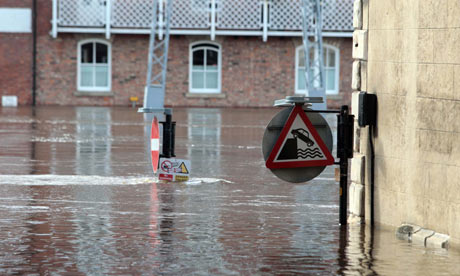2012 second wettest year on record for UK
Met Office figures show past 12 months of rain is 6.6mm less than the wettest UK year recorded in 2000

Water levels rise in the city of York, September 2012, after the river Ouse burst its banks. Photograph: Lindsey Parnaby/EPA
2012 was the second wettest year on record in the UK and the wettest ever in England, the Met Office announced on Thursday.
The downpours that caused more than 8,000 homes and businesses to suffer flooding led to a total of 1,330.7mm of rain for the year, just 6.6mm short of the wettest UK year recorded in 2000 (1337.3mm).
Analysis by the Met Office also suggests that the UK may be getting increasingly wetter as climate change causes warmer air to carry more water. Days of extreme rainfall – downpours expected once every 100 days – occurred every 70 days in 2012.
"The trend towards more extreme rainfall events is one we are seeing around the world, in countries such as India and China, and now potentially here in the UK," said Prof Julia Slingo, chief scientist at the Met Office. "It's essential we look at how this may impact our rainfall patterns going forward over the next decade and beyond, so we can advise on the frequency of extreme weather in the future and the potential for more surface and river flooding."
The exceptionally wet year of 2012 began with a very dry spell and water companies imposing a widespread hosepipe ban. But a deluge followed with April and June both being the wettest months since records began in 1910. December was the eighth wettest on record for the UK.
While England suffered the wettest year on record, 2012 was the third wettest for Wales, the 17th wettest for Scotland and the 40th wettest for Northern Ireland.
The Met Office noted that there has been a high frequency of wet years since 2000 in the UK, with four of the top five wettest years occurring since then. It also found that long-term averages of 30-year periods show an increase in annual rainfall of about 5% from 1961-1990 to 1981-2010, although it notes that there is always a great deal of variability in UK rainfall because the country's position on the western edge of Europe means its weather patterns are constantly changing.
The apparent trend to wetter weather may be influenced by the shrinking of the Arctic ice cap, which reached a record low in 2012, or changes in sea surface temperatures due to natural cycles, said the Met Office. But it said more research needs to be done before the extent of their role can be established.
Despite the government's own scientists concluding that global warming is increasing the risk of flooding in the UK, the coalition cut spending on flood defences by more than 25% in the year it entered office. In July the Guardian revealed that almost 300 schemes that had been in line for funding in 2010 had not been built.
"Rainfall has increased in recent decades over many parts of the northern hemisphere and we're seeing rain falling in heavier bursts," said Prof Nigel Arnell, at the University of Reading. "The sort of wet winters we currently see over northern Europe just once every 20 years could happen almost every other year by the end of the century, but curbs on global greenhouse gas emissions could significantly reduce the expected increase in flood risk."
Ola Holmstrom, head of water at the WSP engineering consultancy, said: "Although much of the long-term solution is about planning and adapting approaches, funding is crucial and public budgets need to be protected. Our core infrastructure will need to be adapted, reinforced and in some cases completely re-built which comes with a cost."
"Make no mistake, climate change is already having a major impact on Britain," said Mike Childs, head of policy, research and science at Friends of the Earth. "So far the world has warmed by an average 0.7C above pre-industrial levels - if temperatures rise by the 4C scientists widely predict then we can only begin to imagine the impacts on our lives and livelihoods."
No hay comentarios:
Publicar un comentario